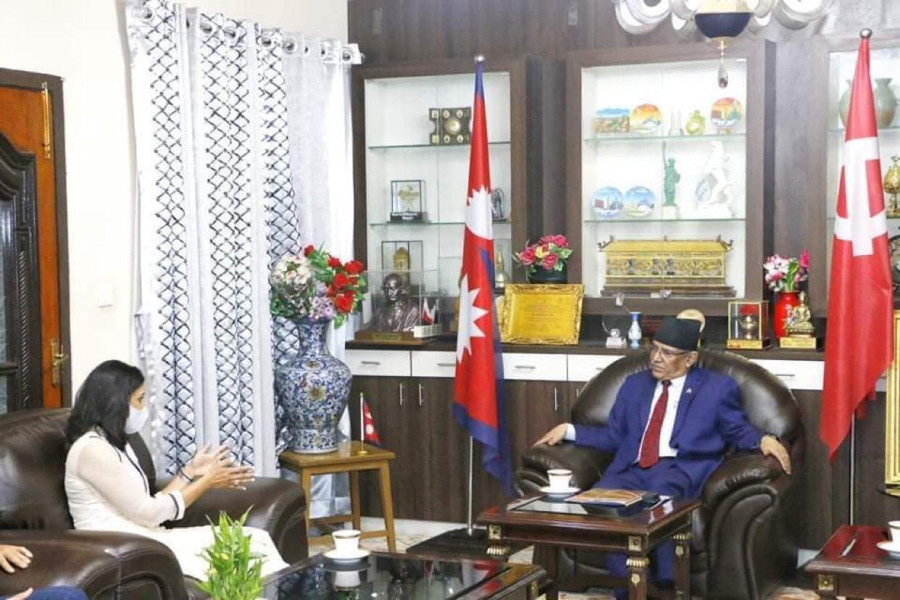National
Maoist Centre tells US officials it is for national consensus on MCC
Since the programme has become a cause of huge debate in Nepal, broader discussion is required, Dahal conveys to the delegation.
Post Report
Officials from the Department of Compact Operations at the Millenium Challenge Corporation met with Pushpa Kamal Dahal, chair of the Communist Party of Nepal (Maoist Center), on Friday morning.
The MCC officials expressed their concerns and their views, said Bishnu Sapkota, Dahal’s press coordinator.
“They said they are not here to put any kind of pressure on Nepali political parties,” added Sapkota.
Fatema Z Sumar and Jonathan Brooks, vice president and deputy vice president at the MCC, are in Kathmandu since Thursday and have been holding a series of meetings with Nepali politicians, as the US programme, signed in 2017 under which Nepal is to receive $500 million, remains stuck in the Parliament as political parties remain divided.
“[Dahal] told the US officials that the MCC has become a cause of a huge debate in Nepal so we are in favour of building national consensus among political parties,” said Sapkota. “The ruling alliance is also discussing the matter, and we will also discuss this with other parties. It will move forward only after there is a national consensus.”
The US officials met Dahal a day after holding talks with KP Sharma Oli, chair of the main opposition CPN-UML, Madhav Nepal, chair of the CPN (Unified Socialist) and Baburam Bhattarai and Upendra Yadav, leaders of the Janata Samajbadi Party.
Oli, who was ready for the MCC’s parliamentary ratification when he was in power, conveyed to the visiting US officials on Thursday that his party would make a position only after the ruling alliance made a position.
The Maoist Centre, a key coalition partner in the Sher Bahadur Deuba government, has for long opposed the MCC, with some of Maoist leaders making public statements that the US programme undermines Nepal’s sovereignty.
The MCC on Wednesday, however, attempted to clear the air on some questions and concerns sent by the Finance Ministry on September 3.
Nepal and the United States signed the agreement four years ago—in September 2017. At that time also, Nepali Congress’ Sher Bahadur Deuba was the prime minister, backed by the Maoist Centre.
The Maoist Centre merged with UML in May 2018 and they formed the Nepal Communist Party (NCP). The Oli government in July 2019 registered the MCC Nepal Compact in the Parliament. However, it could not be ratified after protests from within the Nepal Communist Party (NCP). Dahal was one of the politicians to oppose the MCC, while some UML leaders, like Bhim Rawal, too emerged as vocal critics of the American programmes.
But in March this year, the Supreme Court invalidated the Nepal Communist Party (NCP) and revived the UML and the Maoist Centre.
The Maoist Centre, or its chair Dahal for that matter, is now in a fix. If Dahal shows support for the MCC, he would have a hard time convincing his rank and file; if he refuses to support Deuba in passing the MCC, the ruling alliance could unravel.
Deuba either needs the UML’s support or the support of all its coalition partners–the Maoist Centre, CPN (Unified Socialist) and the Janata Samajbadi Party–to get the MCC Nepal Compact through the Parliament.
MCC officials, however, this time appear to be pretty clear and they seem to be in a mood to hammer home one point to Nepal’s political leadership–take it or leave it.




 19.12°C Kathmandu
19.12°C Kathmandu













